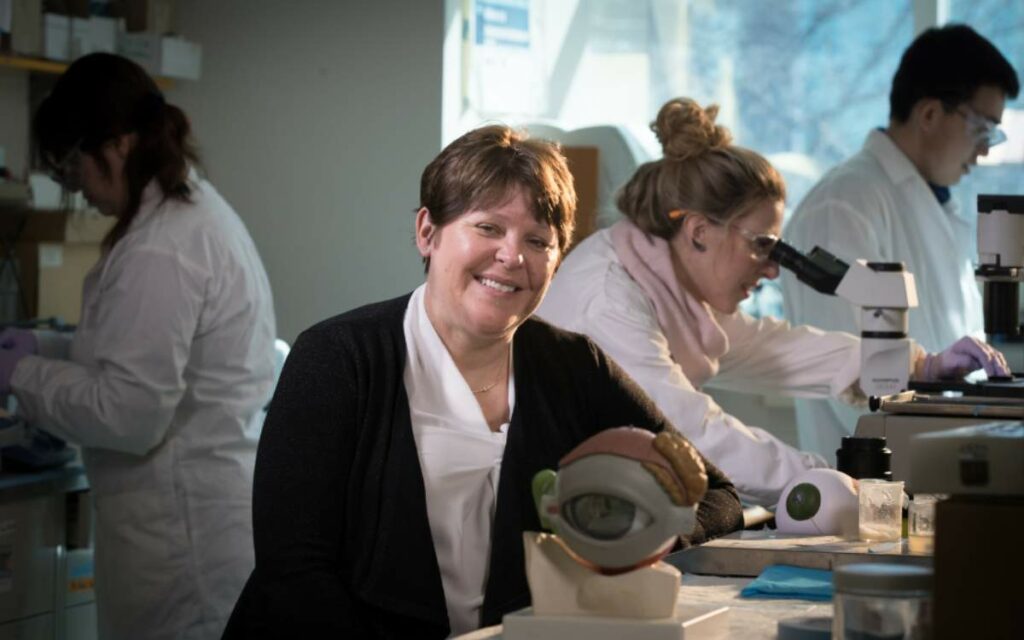
Co-founded by Heather Sheardown (pictured), 20/20 OptimEyes Technologies is one of three McMaster startups that have received a combined $1.27 million to move their innovations closer to reality in the second round of McMaster Seed Fund investments. Photo credit: McMaster University/Brighter World
Three McMaster startups – AIMA Laboratories, LLIF Healthcare and 20/20 OptimEyes Technologies – have received a combined $1.27 million in the second round of McMaster Seed Fund investments.
AIMA Laboratories is a biotech company co-founded by Lauren Foster, professor emeritus in the department of obstetrics and gynecology, and postdoctoral fellow Jocelyn Wessels. The company received $468,500 to advance its blood-testing technology that can be used for at-home screening of endometriosis.
Foster and Wessels say endometriosis is underdiagnosed due to several factors, including the normalization of pain by healthcare providers and the use of pain medications that temporarily mask chronic pelvic pain/period pain (CPP/PP) symptoms.
“The current path to a diagnosis of endometriosis is costly and can take between 5 to 12 years to achieve. Contributing factors to the diagnostic delay include a lack of non-invasive, accessible, and cost-effective screening and diagnostic tests for individuals living with CPP/PP,” says Wessels.
“AIMA lab’s new screening test will provide clarity to individuals living with symptoms of endometriosis, giving them an accelerated path to a diagnosis so they may begin safe and effective treatment plans. This support from the McMaster Seed Fund will be instrumental in bringing our technology closer to the market and to people with CPP/PP,” says Foster.
LLIF Healthcare received $381,500 to further its cloud-based platform which provides doctors and hospitals with data to improve patient care and reduce healthcare costs. Co-founded by associate professor of medicine Shawn Mondoux and clinicians David Hamilton and Charlie Farkas, LLIF is bringing to market their MD Dashboard, which extracts physician practice data from electronic medical records and provides a practice and improvement feedback strategy to doctors.
The technology is already operational at St Joseph’s Healthcare Hamilton and Niagara Health, with implementation beginning soon at Joseph Brant Hospital. The McMaster Seed Fund investment will help LLIF expand operations to other Canadian health centres, says Mondoux.
“Support from the McMaster Seed Fund is a unique advantage for startups that originate at McMaster. This investment will provide our company with further opportunities for development, client acquisition and strategic thinking as we bring our MD Dashboard to new users across Canada’s healthcare system,” he says.
20/20 OptimEyes Technologies – a spin-out from the Sheardown Lab at McMaster and co-founded by Frances Lasowski and Heather Sheardown– received $428,000 to de-risk their patented mucoadhesive micelle nanoparticle (MNP) technology, initially targeted for the treatment of glaucoma.
This eye drop platform provides patients with more comfortable drops, less frequent dosing and increased clinical efficacy. The company will use the investment from the McMaster Seed Fund to do additional proof of concept studies and manufacturing scale-up of the MNP technology.
“OptimEyes’ MNP platform has the potential to improve treatment for millions of glaucoma patients. 50% of glaucoma patients don’t use their drops regularly, and our platform will improve their compliance and reduce their risk of blindness. We are currently de-risking our platform within the C20/20 Innovation Hub, and this Seed Fund investment will allow us to accelerate our milestones and get started on clinical trials,” says Lasowski.
Karen Mossman, McMaster’s vice-president, research says the second round of Seed Fund investments will build on the success of the first – which saw startups Synmedix and Insight Medbotics receive a combined $735,000 to move their medical innovations closer to reality.
“The first round of funding was incredibly successful, fueling significant growth and development for two innovative McMaster startups. We are proud to support the newest recipients as they transfer their ground-breaking technologies to clinics and patients across Canada,” she says.
The second round was especially competitive, says Gay Yuyitung, executive director of McMaster’s Industry Liaison Office (MILO), which manages the Seed Fund. 21 proposals were submitted from start-ups commercializing research across a wide range of disciplines. 15 were invited to pitch to the investment committee, and three were selected for investment.
“The MILO team is looking forward to supporting these startups as they take their technologies to the next level and contribute to McMaster’s growing culture of entrepreneurship and innovation,” she says.
Launched in September 2021, the McMaster Seed Fund (MSF) is an early-stage investment vehicle designed to foster innovative startup companies coming out of McMaster research with the potential for significant economic and societal impact in the Hamilton region and beyond.
This article was first published on Brighter World on Nov. 11, 2022. Read the original article here.






